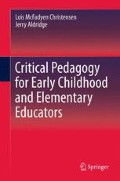Abstract
Every early childhood and elementary educator operates in life from a set of assumptions. This chapter offers ways for readers to consider the unrecognized and unexamined aspects of these assumptions. Certain forms of knowledge are valued more than others in schools. For example, presently science and math are more valued than music and the arts. Also, school knowledge belongs to a particular group of people. Children and families who do not have school knowledge are at a disadvantage. Finally, people in power exercise their position to maintain dominance to keep those places in society. Early childhood and elementary educators are encouraged to deconstruct long-held assumptions. What can educators do to make a difference in their classrooms and communities when these three assumptions of critical pedagogy are pervasive in the school systems in which they teach?
Access this chapter
Tax calculation will be finalised at checkout
Purchases are for personal use only
References
Ada, A. F. (2000). Gateways to the sun. Miami: Alfaguara. Retrieved January 21, 2011 from http://www.colorincolorado.org/article/34169.
Aldridge, J., & Goldman, R. (2007). Current issues and trends in education. New York: Allyn & Bacon.
Apple, M. (1999). Power, meaning, and identity: Essays in critical education studies. New York: Peter Lang.
Banks, J. A. (2008). An introduction to multicultural education. New York: Allyn & Bacon.
Bartolome, L. I. (2009). Beyond the methods fetish. In A. Darder, M. P. Baltodano, & R. D. Torres (Eds.), The critical pedagogy reader (2nd ed.). New York: Routledge.
Berry, K. S. (1998). Nurturing the imagination of resistance: Young adults as creators of knowledge. In J. L. Kincheloe & S. R. Sternberg (Eds.), Unauthorized methods: Strategies for critical teaching. New York: Routledge.
Berry, K. S. (2007). Locations (or not) of critical pedagogy in les petities et les grandes histories. In P. McLaren & J. L. Kincheloe (Eds.), Critical pedagogy: Where are we now? New York: Peter Lang.
Cannella, G. S. (1997). Deconstructing early childhood education: Social justice and revolution. New York: Peter Lang.
Delpit, L. (2009). Language diversity and learning. In A. Darder, M. P. Baltodano, & R. D. Torres (Eds.), The critical pedagogy reader (2nd ed.). New York: Routledge.
Dershowitz, A. M. (1997). The vanishing American Jew: In search of Jewish identity for the next century. New York: Little, Brown.
Friere, P. (1998). Pedagogy of freedom: Ethics, democracy, and civic courage. Lanham, MD: Rowman & Littlefield.
Giroux, H. A. (1988). Teachers as intellectuals: Toward a critical pedagogy of learning. Westport, CT: Greenwood Publishing Group.
Giroux, H. (October 27, 2010). Lessons From Paulo Freire, Chronicle of Higher Education. Retrieved from: http://staff.washington.edu/changed/2010/10/lessons-from-paulo-freire/.
Giroux, H. A. (2011). On critical pedagogy. New York: Continuum.
Giroux, H. A., & McLaren, P. (Eds.). (1989). Critical pedagogy, the state and cultural struggle. Albany: State University of New York Press.
Goodlad, J. I. (1984). A place called school: Prospects for the future. New York: McGraw Hill.
Great City Schools. (2006, June). Urban school superintendents: Characteristics, tenure, and salary. Fifth survey and report. Urban Indicator, 8(1), 1–10.
Greene, M. (1995). Releasing the imagination: Essays on education, the arts, and social change. San Francisco, CA: Jossey Bass Publishers.
Hooks, B. (2009). Confronting class in the classroom. In A. Darder, M. P. Baltodano, & R. D. Torres (Eds.), The critical pedagogy reader (2nd ed.). New York: Routledge.
Katz, L. (1998). What can we learn from Reggio Emilia? In C. Edwards, L. Gandidni, & G. Forman (Eds.), The hundred languages of children: The Reggio Emilia approach—Advanced reflections. Westport, CT: Ablex Publishing Company.
Kessler, S., & Swadener, B. (Eds.). (1992). Reconceptualizing the early childhood curriculum: Beginning the dialogue. New York: Teachers College Press.
Kincheloe, J. (2004). Critical pedagogy. New York: Peter Lang.
Kincheloe, J. L. (2008). Critical pedagogy primer (2nd ed.). New York: Peter Lang Publishing.
Lipman, P. (1999). Race, class and power in school structuring. Albany, NY: State University of New York Press.
Malaguzzi, L. (1994). Listening to children. Young children, 49(5), 55.
McLaren, P. (2008). Life in schools: An introduction to critical pedagogy in the foundations of education. New York: Longman.
McLaren, P. (2009). Critical pedagogy. A look at the major concepts. In A. Darder, M. P. Baltodano, & R. D. Torres (Eds.), The critical pedagogy reader (2nd ed.). New York: Routledge.
McLaren, P., & Kincheloe, J. L. (Eds.). (2008). Critical pedagogy: Where are we now? New York: Peter Lang Publishers.
Savage, T. V., & Armstrong, D. G. (2000). Effective teaching in elementary social studies. New York: Prentice Hall.
Sunal, C. S., & Haas, M. E. (2011). Social Studies for the elementary and middle grades: A constructivist approach. Boston, MA: Allyn & Bacon.
US Department of Education. (2002). No child left behind: A desktop reference. Washington, DC: Author.
United States Holocaust Memorial Museum. Retrieved January 18, 2011 from http://www.ushmm.org/museum/exhibit/online/phistories/phi_individuals_kurt_gerda_klein_uu.htm
Author information
Authors and Affiliations
Rights and permissions
Copyright information
© 2013 Springer Science+Business Media Dordrecht
About this chapter
Cite this chapter
Christensen, L.M., Aldridge, J. (2013). Assumptions: Where Are We?. In: Critical Pedagogy for Early Childhood and Elementary Educators. Springer, Dordrecht. https://doi.org/10.1007/978-94-007-5395-2_4
Download citation
DOI: https://doi.org/10.1007/978-94-007-5395-2_4
Published:
Publisher Name: Springer, Dordrecht
Print ISBN: 978-94-007-5394-5
Online ISBN: 978-94-007-5395-2
eBook Packages: Humanities, Social Sciences and LawEducation (R0)

